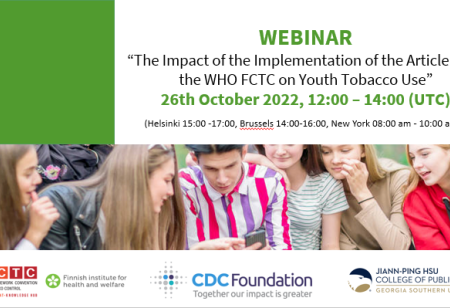

Written by professor Pekka Puska (MD, PhD, MPolSc), chair of the WHO FCTC impact assessment Expert Group.
Monitoring and research are keys to effective policy
Global tobacco control took a major step when the WHO Framework Convention on Tobacco Control (WHO FCTC) was adopted in 2003 and entered into force in 2005. In 2014, when the 10th anniversary of the WHO FCTC was approaching, the Parties to the Convention decided to establish an independent expert group (EG) to assess the impact of the WHO FCTC in its first decade.
The EG conducted its work in 2015–16. The report of the group was presented to the Seventh Conference of Parties in Delhi in 2016 (1). In June 2019, a special supplement of the WHO FCTC impact assessment was also published in the journal Tobacco Control (2). In this supplement, the methodology used in the assessment is described in an article by Fong, Chung-Hall & Craig (3) and the main findings are summarized and discussed in an article by Puska and Daube (4).
In short, the EG used different sources of information for its assessment work. The implementation reports that Parties submit to the biennial reporting of the WHO FCTC, as well as published research papers, were used. In addition, especially to understand how the WHO FCTC has potentially influenced the processes of national tobacco control work, the EG made missions to 12 countries from all WHO regions and from different economic levels. Experiences from these missions were also published by Graig et al. in the supplement of Tobacco Control (5).
The report of the EG clearly shows that there have been substantial gains in tobacco control since the WHO FCTC came into force, but there has been great variability across countries and policy areas. The main finding was that in general, the WHO FCTC has made a major contribution to tobacco control policy and implementation. However, it also showed the many constraints and the influence of tobacco industry that continue to hamper the development in many countries.
Role of research and monitoring
During the country missions, it became clear that the role of national research on public health aspects of tobacco and tobacco control measures is of great importance. Although there is nowadays strong international research evidence on various aspects of tobacco control, own research in countries and the contribution of national researchers to the public discussion are of crucial value to catalyse good national progress in tobacco control and in the implementation of the WHO FCTC.
Another crucial element, and often the foundation for national research, is national tobacco monitoring. This monitoring (surveillance) should naturally concern especially the trends in tobacco use (smoking, smokeless tobacco, new and emerging products), and preferably also in different population subgroups. In addition to the patterns of use, data of the national burden of diseases arising from tobacco use are vital. Broader tobacco control monitoring should also, if possible, deal with various process factors in tobacco use (eg. knowledge, attitudes, intentions) and with tobacco control policy measures and their implementation.
During the work of the EG it became clear that national monitoring is a key area for development in many countries. In its report, the EG mentioned the lack of sustainable national tobacco control surveillance systems as one of the obstacles for progress. Many countries have sporadic studies on tobacco use prevalence, but not often with national coverage. And very few countries have standardized reliable national monitoring system that is able to measure the trends in tobacco use.
Sporadic studies and research are often carried out by local universities, and are of course useful. However, sustainable national monitoring calls for a sustainable national focal point (often national public health institute) with expertise and necessary resources.
Experience from many countries has shown the crucial role of national monitoring in fostering national tobacco control work. Monitoring is not only useful for evaluation and planning of national tobacco control measures, but very useful to promote public interest through media reports and comments.
About the author:
Pekka Puska, MD, PhD, MPolSc
Director General emeritus, Finnish Institute for Health and Welfare
Prof. Puska has served as Director General of the National Public Health Institute and the Finnish Institute for Health and Welfare., and twice as Member of Finnish National Parliament. He has over 500 scientific publications in field of epidemiology and public health. Internationally he has served, among other things, as Director for NCD Prevention and Health Promotion at WHO/HQ and as President of International Association of National Public Health Institutes (IANPHI) and World Heart Federation. Among his several honors are Honorary Doctorate at St. Andrew’s University (Scotland) and Lisbon University, as well as Academician of the Russian Academy of Natural Sciences.
In October 2019, prof. Puska received the first Dr. Ancel Keys Award from the American College of Lifestyle Medicine (ACLM). The award was established to recognize a person who has made significant contributions to thought, evidence, practice and policy through research and the application of scientific principles, with particular emphasis on public health issues and population science. Previously he has received, among other recognition, WHO’s annual Health Education Award in 1990, WHO Tobacco Free World Award in 1999, the Nordic Award for Public Health in 2005, and the Rank Prize in 2008.
References
- FCTC/COP/7/6. Impact assessment of the WHO FCTC. Report by the Expert Group. Conference of the Parties to the WHO FCTC. Seventh Session.
- Impact assessment of the WHO FCTC. Tobacco Control 2019;28(Suppl 2).
- Fong GT, Chubg-Hall J, Craig L. Impact assessment of the WHO FCTC over its first decade: methodology of the expert group. Tobacco Control 2019;28:s84-88.
- Puska P & Daube M. Impact assessment of the WHO Framework Convention on Tobacco Control: introduction, general findings and discussion. Tobacco Control 2019;27:s.81-83
- Craig L, Fong GT, Chung-Hall J, Puska P. Impact of the WHO FCTC on tobacco control: perspectives from stakeholders in 12 countries. Tobacco Control 2019;28:s129-135.





